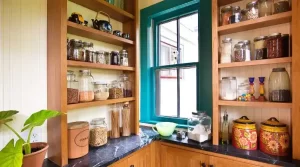Which is better, granite or quartz? is a question that many of our clients ask us when they start their remodeling projects. We will discuss the advantages and disadvantages of each of these common kitchen countertop materials.
GRANITE
Pros:
1. Durability. For many years, granite has been a tried-and-true option for countertops. It has stood the test of time and appeals to everyone. Granite is a nice feature that prospective buyers love to see if you know you plan to move.
2. It comes in broad slabs. Granite slabs can be found in a broad variety of forms and sizes, however, slabs wider than 70 inches are more typical (quartz slabs are seldom larger than 65 inches wide). Wide slabs are really advantageous when upgrading your kitchen because they typically result in fewer seams.
3. The price may drop. Choosing a high-end, exotic granite will undoubtedly cost more than choosing quartz. But the wonderful thing about granite is that, depending on what you’re looking for, there are more affordable possibilities.
4. Beauty in Nature. Granite is a natural substance with unique patterns and textures that are unmatched elsewhere. Because each slab is distinctive, you can really personalize your house. Your granite slab will be unique and will not be found elsewhere!
Cons:
1. It has pores. Like other stone types, granite is not inherently moisture-resistant. Although there is a danger that spills and water rings could stain your countertops, it is better to avoid letting them sit for too long. The majority of spills don’t require quick cleanup, and a designed substance like quartz is nonporous and better able to endure long-term exposure to moisture.
2. It needs greater upkeep. Granite only needs a little bit more care than quartz; it is not a material that requires extensive upkeep. Granite requires special care while cleaning and maintaining, as well as periodic resealing (every two to five years).
3. A majority of designs are “busy.” People either love or loathe granite’s pronounced pattern movement, according to our research. Quartz is perhaps your best option if you want countertops with few patterns.
4. It is fragile. Without a doubt, granite has incredible strength. Yet, during installation, it frequently breaks far more easily than quartz does. The majority of installers will cover the cost of a new slab by patching cracks, but this can extend the duration of your project.
QUARTZ
Pros:
1. It requires little upkeep. Quartz is less susceptible to spills and stains than granite and doesn’t require sealing. Always make sure to check with your manufacturer’s cleaning and maintenance guide before using a specific product because quartz can react poorly with some chemicals.
2. More durable than untreated stone. While quartz is not immune to scuffs and stains, it’s about as stain and scratch resistant as countertops can go. It is an engineered product, making it nonporous and less stain-prone. The resins and polymers utilized throughout the production process also make it difficult to crack or break during installation.
3. It’s well-liked. Quartz is a significant selling element for purchasers and delivers a larger return on investment if you are intending on selling your house in the future. Click here.
4. It provides uniform, tidy styles. Quartz has a solid, consistent coloration that makes it a perfect fit in practically any kitchen! If you’re searching for a countertop that isn’t “busy” and works like granite, this is it.
Cons:
1. It’s more pricey. A higher price tag is typically associated with greater strength and less upkeep.
2. It cannot be used for installations outdoors. Quartz is often heat-resistant, however, it is ineffective outside. While granite will easily withstand sunshine and other weather conditions, its surface will eventually fade and discolor from exposure to the sun.
3. The appearance of identical-colored slabs never varies. The appearance of quartz slabs is consistent and predictable from slab to slab. You won’t discover a really distinctive countertop made of quartz if you’re looking for one.
4. It’s not a genuine article. Quartz is a resilient and inventive material, yet it will never be entirely natural or unique.
So, granite or quartz, which is better? Since we’re a divided team, we’ll let you make that decision.







